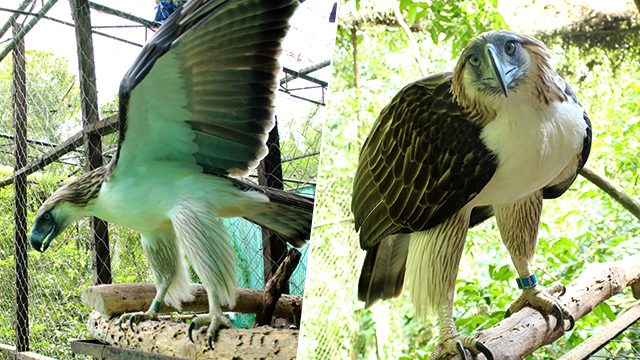SUMMARY
This is AI generated summarization, which may have errors. For context, always refer to the full article.

MANILA, Philippines – The Philippines will be loaning a pair of Philippine eagles to Singapore in a bid to increase the population of the country’s national bird, which is listed as critically endangered.
The Department of Environment and Natural Resources on Monday, May 20, signed a wildlife loan agreement with Wildlife Reserve Singapore to send 15-year-old male eagle Geothermica and 17-year-old female eagle Sambisig to the Jurong Bird Park.
Singaporean Ambassador Gerard Ho Wei Hong said that the 2 eagles are a physical manifestation of the close ties between SG and PH. Both countries are celebrating 50 years of diplomatic ties. | @rapplerdotcom
Both Geothermica and Sambisig were bred in captivity at the Philippine Eagle Center in Davao City, and have had 4 pairing attempts, including with each other. These two birds are currently under the care of the Philippine Eagle Foundation (PEF).
The pair will be shipped to Singapore on June 4 and will be shown to the public at Asia’s largest bird park by July. Aside from breeding and the display of the birds, Singapore will continue to collaborate with the Philippines on preserving the eagles.
Under the agreement, the birds and their offspring will remain owned by the Philippine government. Their chicks, however, can be sent back to the Philippines, while the parents might stay longer in Singapore.
PEF executive director Dennis Salvador said the loan can last for about 10 years and can be renewed.
“The significance of our agreement with Singapore is that this serves as an insurance policy for our eagles,” Salvador added.
“So that if anything bad happens to the current population here in the country, we have a set of gene pool outside the country that we can [use] to propagate in the Philippines.”
The PEF itself has produced 28 captive-bred eagles at the Philippine Eagle Center, which includes Geothermica and Sambisig. Salvador said it takes around two years for Philippine eagles to produce an egg.
Environment Secretary Roy Cimatu echoed Salvador, saying that the loan agreement also serves as a way for the country to have a “fallback population, in the event of catastrophic events like disease outbreaks or extreme natural calamities.”
The plan to loan Philippine eagles to other countries for breeding and conservation began 10 years ago, Cimatu added.
In 2016, Singapore proposed to host a pair, but it was only in 2018 that the government allowed the keeping of captive eagles in qualified institutions.
Cimatu said they are also working with another country to loan another pair, but did not disclose any further details. – Rappler.com
Add a comment
How does this make you feel?
There are no comments yet. Add your comment to start the conversation.